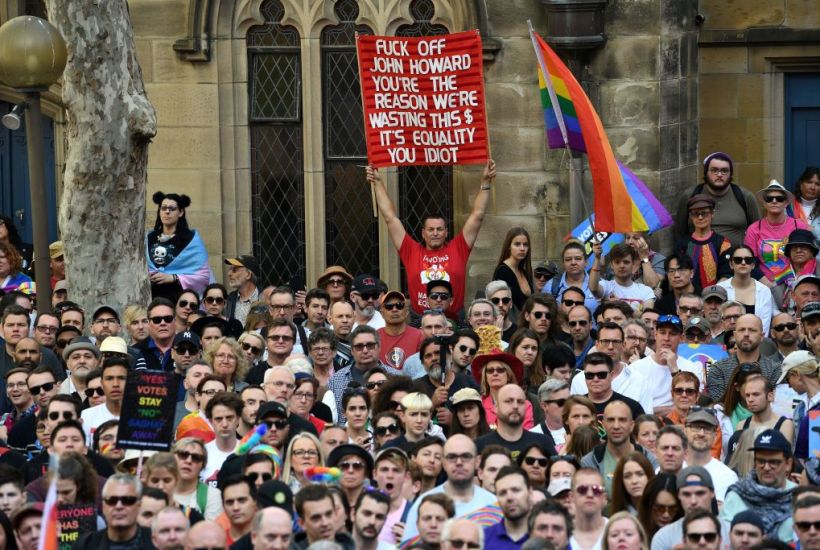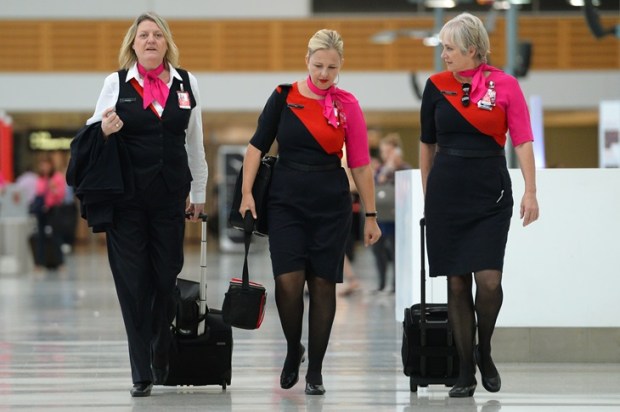The great ship, Democratic Australia is drifting towards the stormiest seas since the 1930s. We face multiple threats, both foreign and domestic, as we slow in the water, turn to port (the Left) and find ourselves rudderless. We are bewildered by the swarm-like tactics of activists, firing off multiple missiles at the vessel from all directions. No sooner does one missile strike than another is let loose, all with the appearance of a coordinated attack.
As I look out at our nation today it seems that this magnificent vessel — not perfect, but the envy of most of the world — is actually very vulnerable. The ship’s communication systems have been almost disabled. It is harder than ever for the ship’s company to make themselves heard, to hear others, and to seek answers to their important questions.
In the light of the current postal plebiscite to redefine the institution of marriage I believe that there are three critical threats facing our society, all of which affect essential freedoms.
First and foremost, there is the threat with respect to our freedom of speech. This freedom is in fact the one by which we defend all other freedoms. The modern tendency seems to be to dictate what we think and say.
In relation to giving the people a say, the argument was that advocates of traditional marriage should be silenced because they could not be trusted to remain civil — they would likely succumb to bigotry, hatred and homophobia. However, what we see now is that those most vigorously advocating for change have, ironically, themselves been the most active in preventing this civil debate. For any country founded upon the ideals of democracy and free speech this is deeply alarming.
For instance, the Cooper’s Brewery advertisement saw a light-hearted discussion between two elected members of the House of Representatives. The shouting, screaming and vindictiveness of the responses gave us an insight into the humourless and unforgiving society which operates according to these new debating rules.
Something else in this regard which should concern us all is the controlling influence that the media has had in framing this whole debate. What has become clear is that it is much harder to hear the ‘no’ case because many of those who have the responsibility for facilitating the free exchange of information have for the most part been campaigning rather than informing.
The second threat we face is to our freedom of association. The right to meet with whom we will, when we will, and where we will, is fundamental to the good ordering of any society. A number of examples over the past year or so have made it patently clear that this can no longer be taken for granted. For instance, in 2016 staff at the Mercure Hotel were threatened and intimidated merely because of a booking by a group of traditional marriage supporters.
Shortly afterwards, we saw the even more alarming case of a senior business executive at IBM who targeted by same-sex marriage keyboard warriors over his board position at the Lachlan Macquarie Institute. In truth, this incident is deeply chilling. Insisting that someone make a choice between their career and involvement in a perfectly legal and commendable not-for-profit organisation is unconscionable.
Further, this also raises the very real prospect that all sorts of involvements – for instance, simply sending your child to a local, faith based school – might be a career ruining activity if some activist somewhere sees the opportunity for disruption.
However, perhaps the most concerning threat is to our freedom of religion. Those advocating for same-sex marriage have now begrudgingly admitted that a ‘yes’ vote will result in real consequences, especially in this area. Having for so long denied that this was a vote for anything other than marriage, we now see politicians pleading for us to vote ‘yes’ but also asking us to ‘trust’ them to subsequently secure religious freedom.
Why should we believe them? After all, this is the same parliament that has twice refused to honour an election commitment for a full plebiscite and even went to the High Court to try and prevent the Australian people from having a say. What’s more, there has been a Senate inquiry into the issue of religious protection and it revealed that there is almost total opposition from marriage redefinition activists to any religious exemptions. Further, the refusal to recognise that removing gender from marriage is likely to have massive flow on implications not just for churches but for freedom of speech, schools and charities. The international experience also confirms this to be the case.
Of even more note is that our elected representatives who should defend our freedoms have failed to draw our attention to the fact that most of Australia’s anti-discrimination laws are in fact state based. Effective protection of religious freedom would require the co-operation of the Commonwealth, State and Territory governments. In other words, if they are seriously committed to religious freedom, they need to show how they can guarantee it in every jurisdiction in Australia. Good luck with that!
In conclusion, we do not need any further disruption in this country. The great ship Democratic Australia is already listing dangerously. We must insist on a restoration of civility, mutual respect, quality debate, and balanced treatment in the media, especially the taxpayer funded ABC.
In the next two months we must insist on better if we are going to navigate the threats facing us as a nation. If we are to protect our freedoms of speech, association and religion, it is vital that we vote ‘No’ in the plebiscite. This is our only hope of steadying the ship.
John Anderson is a former leader of the Nationals and deputy prime minister of Australia.
Got something to add? Join the discussion and comment below.
Got something to add? Join the discussion and comment below.
Get 10 issues for just $10
Subscribe to The Spectator Australia today for the next 10 magazine issues, plus full online access, for just $10.


























Comments
Don't miss out
Join the conversation with other Spectator Australia readers. Subscribe to leave a comment.
SUBSCRIBEAlready a subscriber? Log in